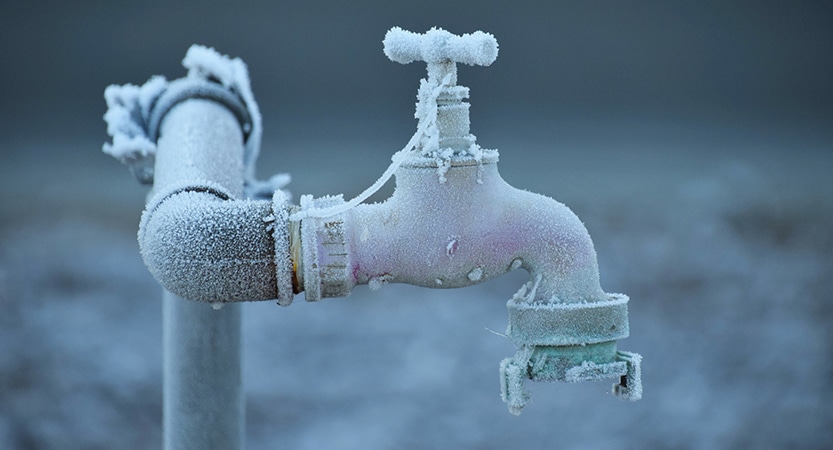Crucial Advice to Avoid Frozen Pipes in Cold Weather
Crucial Advice to Avoid Frozen Pipes in Cold Weather
Blog Article
We have uncovered this great article involving How To Avoid Freezing Pipes below on the web and decided it made sense to discuss it with you on my blog.

Winter can wreak havoc on your pipes, particularly by freezing pipes. Below's how to stop it from taking place and what to do if it does.
Intro
As temperatures decline, the threat of icy pipelines boosts, potentially bring about expensive repair work and water damages. Recognizing just how to prevent icy pipelines is critical for house owners in cool environments.
Prevention Tips
Insulating susceptible pipes
Wrap pipes in insulation sleeves or utilize heat tape to safeguard them from freezing temperature levels. Concentrate on pipelines in unheated or external locations of the home.
Home heating methods
Keep indoor spaces properly heated, especially areas with plumbing. Open closet doors to allow cozy air to circulate around pipelines under sinks.
How to identify icy pipes
Seek decreased water circulation from faucets, unusual smells or sounds from pipelines, and noticeable frost on exposed pipes.
Long-Term Solutions
Structural changes
Consider rerouting pipelines far from exterior wall surfaces or unheated locations. Include additional insulation to attic rooms, cellars, and crawl spaces.
Updating insulation
Invest in premium insulation for pipelines, attic rooms, and wall surfaces. Correct insulation aids maintain constant temperatures and lowers the threat of icy pipelines.
Shielding Exterior Pipes
Yard tubes and exterior taps
Separate and drain pipes garden hose pipes prior to wintertime. Set up frost-proof spigots or cover outdoor taps with shielded caps.
Understanding Frozen Pipes
What creates pipes to freeze?
Pipelines freeze when revealed to temperature levels below 32 ° F (0 ° C) for extended periods. As water inside the pipelines ices up, it increases, taxing the pipeline wall surfaces and potentially creating them to break.
Threats and damages
Frozen pipes can bring about water supply disturbances, property damages, and pricey repair services. Burst pipes can flooding homes and cause substantial structural damage.
Indicators of Frozen Pipes
Determining icy pipes early can stop them from bursting.
What to Do If Your Pipelines Freeze
Immediate actions to take
If you presume icy pipelines, maintain taps open up to soothe pressure as the ice thaws. Make use of a hairdryer or towels soaked in hot water to thaw pipes slowly.
Final thought
Stopping frozen pipes requires proactive steps and quick actions. By comprehending the reasons, indications, and safety nets, home owners can shield their pipes throughout cold weather.
Helpful Tips to Prevent Frozen Pipes this Winter
UNDERSTANDING THE BASICS: WHY PIPES FREEZE AND WHY IT’S A PROBLEM
Water freezing inside pipes is common during the winter months, but understanding why pipes freeze, and the potential problems it can cause is crucial in preventing such incidents. This section will delve into the basics of why pipes freeze and the associated problems that may arise.
THE SCIENCE BEHIND FROZEN PIPES
When water reaches freezing temperatures, it undergoes a physical transformation and solidifies into ice. This expansion of water as it freezes is the primary reason pipes can burst. As the water inside the pipe freezes, it expands, creating immense pressure on the walls. If the pressure becomes too great, the pipe can crack or rupture, leading to leaks and water damage.
FACTORS THAT CONTRIBUTE TO PIPE FREEZING
Low Temperatures: Extremely cold weather, especially below freezing, increases the risk of pipes freezing. Uninsulated or Poorly Insulated Pipes: Pipes located in unheated areas, such as basements, crawl spaces, or attics, are more prone to freezing. Insufficient insulation or lack of insulation altogether exacerbates the problem. Exterior Wall Exposure: Pipes running along exterior walls are susceptible to freezing as they encounter colder temperatures outside. Lack of Heating or Temperature Regulation: Inadequate heating or inconsistent temperature control in your home can contribute to frozen pipes. PROBLEMS CAUSED BY FROZEN PIPES
- Pipe Bursting: As mentioned earlier, the expansion of water as it freezes can cause pipes to burst, resulting in significant water damage.
- Water Damage: When pipes burst, it can lead to flooding and water damage to your property, including walls, ceilings, flooring, and personal belongings.
- Structural Damage: Prolonged exposure to water from burst pipes can compromise the structural integrity of your home, leading to costly repairs.
- Mold and Mildew Growth: Excess moisture from water damage can create a favorable environment for mold and mildew growth, posing health risks to occupants.
- Disrupted Water Supply: Frozen pipes can also result in a complete or partial loss of water supply until the issue is resolved.
WHY CERTAIN PIPES ARE MORE PRONE TO FREEZING
- Location: Pipes located in unheated or poorly insulated areas, such as basements, crawl spaces, attics, or exterior walls, are at higher risk of freezing.
- Exterior Pipes: Outdoor pipes, such as those used for irrigation or exposed plumbing, are particularly vulnerable to freezing as they are directly exposed to the elements.
- Supply Lines: Pipes that carry water from the main water supply into your home, including the main water line, are critical to protect as freezing in these lines can affect your entire plumbing system.
- Underground Pipes: Pipes buried underground, such as those connected to sprinkler systems or outdoor faucets, can be susceptible to freezing if not properly insulated.
https://busybusy.com/blog/helpful-tips-to-prevent-frozen-pipes-this-winter/

Hopefully you liked our excerpt on Preventing and dealing with frozen pipes. Many thanks for taking a few minutes to read through our article post. Liked our write up? Please quickly share it. Help another person find it. Thanks so much for going through it.
Detail Report this page